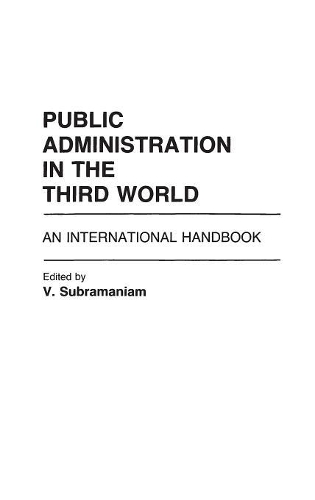
Public Administration in the Third World: An International Handbook
(Hardback)
Publishing Details
Public Administration in the Third World: An International Handbook
By (Author) V. Subramaniam
Bloomsbury Publishing PLC
Greenwood Press
26th June 1990
United States
Classifications
Tertiary Education
Non Fiction
Management and management techniques
Civil service and public sector
350.00091724
Physical Properties
Hardback
456
Description
This multi-author reference handbook gives a picture of the evolution, structure and processes of public administration in representative Third World countries. It presents empirical studies of developing nations in Asia, the Middle East, North and Sub-Saharan Africa, the West Indies and Latin America. The resulting data are shaped into a theoretical framework delineating the complex relationships of state, bureaucracy and class in the Third World. Subramaniam's introduction provides an overview of "development" literature in the field. Each case study begins with an historical introduction and discusses the political, executive and the administrative structures and processes. Among the specific topics covered are public enterprises, administrative departments, personnel, financial administration, and regional and local administrative units. The majority of the systems studied are affected by the unregulated power of public enterprises, the persistence of colonial legacies and the elitism of the bureaucracy. The concluding section relates these common elements to the sociohistorical characteristics of the middle-class groups that dominate both politics and public administration.
Reviews
"This valuable collection of up-to-date studies of public administration in the Third World, by well informed scholars from the areas reported on, is edited by Professor V. Subramaniam, who also provides introductory and concluding chapters. Eleven of the contributions treat specific countries in Asia, the Middle East and North Africa, and Sub-Saharan Africa. Two deal with regions in the Western Hemisphere--the English-speaking Caribbean and the southern cone of Latin America. This handbook helps fill a major need in the study of comparative and development administration."-Ferrel Heady Professor Emeritus Public Administration and Political Science University of New Mexico
The search for common themes in Third World public administration is this volume's organizing principle. The contributors start with a thoughtful review of the literature. The main part of the volume consists of case studies of the evolution, structures, and processes of public administration in Bangladesh, India, Pakistan, the Philippines, Egypt, Iran, Saudi Arabia, Turkey, Ghana, Nigeria, Zambia, Latin America, and the English-speaking Caribbean. Scholars who investigated their own countries present well-documented and well-written case studies that vary substantially from descriptions of structures to analyses of the interaction of society, politics, and the administrative apparatus. The book concludes with a chapter on common themes of Third World public administration, a good bibliographical guide, and an appendix by the editor on the derivative middle class, which he believes should be the unifying concept in the comparative study of Third World pulic administration. Although this hypothesis is interesting, the variety of phenomena described in the cases suggests that no single concept can serve this integrative function. Upper-division undergraduates and above.-Choice
"The search for common themes in Third World public administration is this volume's organizing principle. The contributors start with a thoughtful review of the literature. The main part of the volume consists of case studies of the evolution, structures, and processes of public administration in Bangladesh, India, Pakistan, the Philippines, Egypt, Iran, Saudi Arabia, Turkey, Ghana, Nigeria, Zambia, Latin America, and the English-speaking Caribbean. Scholars who investigated their own countries present well-documented and well-written case studies that vary substantially from descriptions of structures to analyses of the interaction of society, politics, and the administrative apparatus. The book concludes with a chapter on common themes of Third World public administration, a good bibliographical guide, and an appendix by the editor on the derivative middle class, which he believes should be the unifying concept in the comparative study of Third World pulic administration. Although this hypothesis is interesting, the variety of phenomena described in the cases suggests that no single concept can serve this integrative function. Upper-division undergraduates and above."-Choice
Author Bio
V. SUBRAMANIAM is Professor of Political Science at Carleton University, Ottawa. He is the author of ten books including Cultural Integration of India: A Socio-Historical Analysis (1983) and Transplanted Indo-British Administration (1977). He has taught in universities in all five continents, has researched and taught in several Afro-Asian countries and has trained their administrators as well. In addition, Dr. Subramaniam has held several distinguished appointments such as the Simon Senior Fellowship at Manchester University as well as visiting appointments at Heidelberg, Leningrad, and several other universities.
